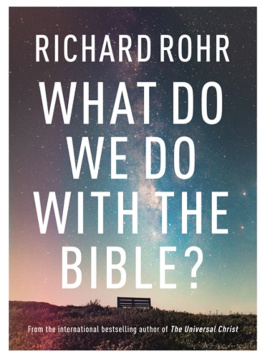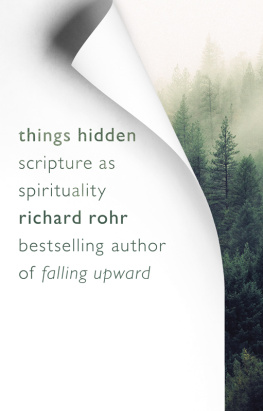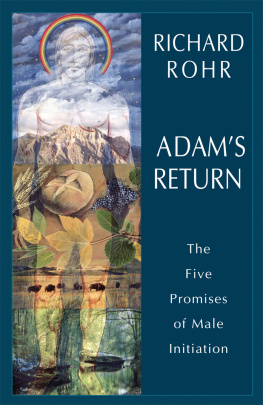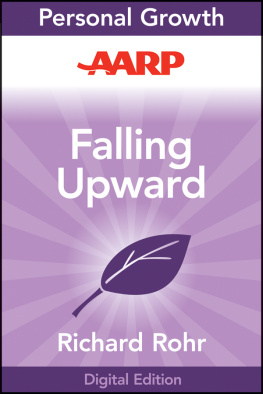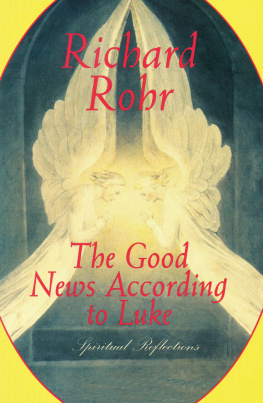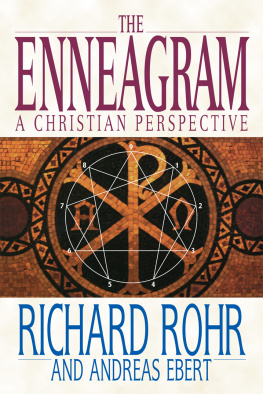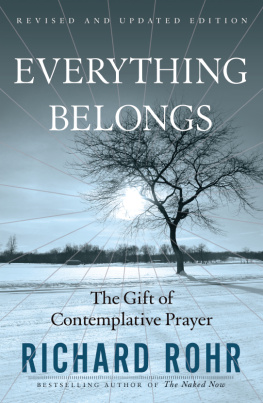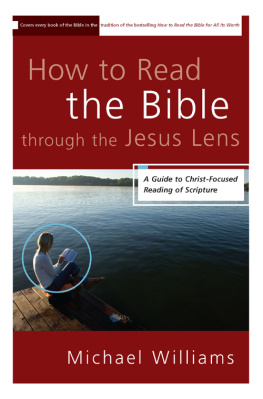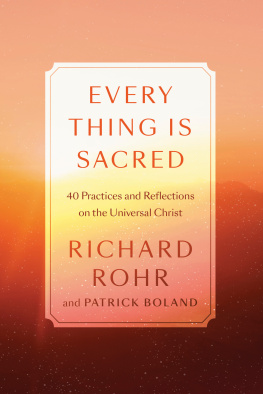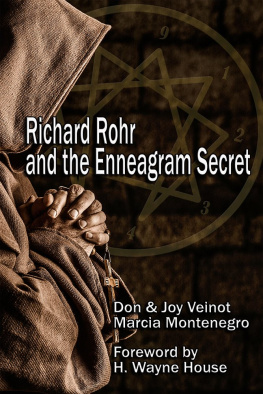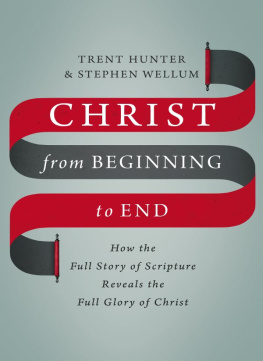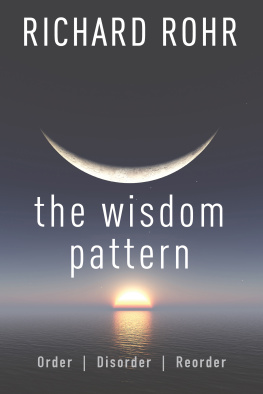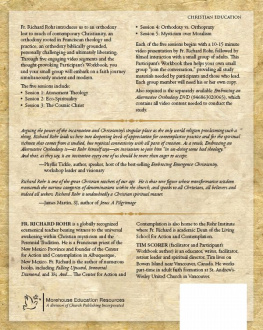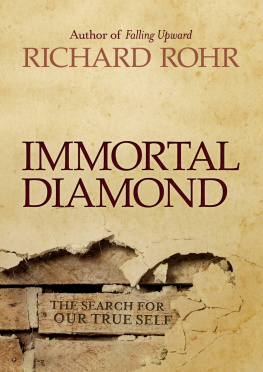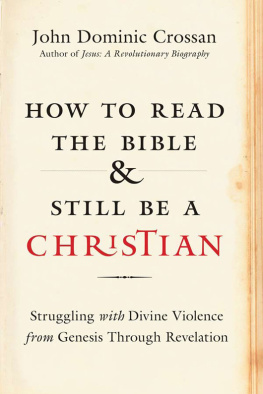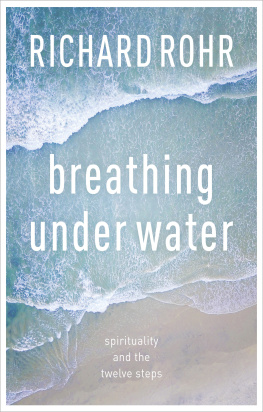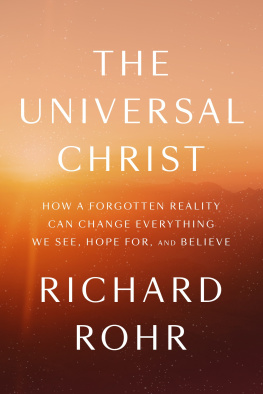
Richard Rohr, OFM, is a Franciscan priest of the New Mexico Province and the Founding Director of the Center for Action and Contemplation in Albuquerque, New Mexico. An internationally recognized author and spiritual leader, Fr. Richard teaches primarily on incarnational mysticism, non-dual consciousness, and contemplation, with a particular emphasis on how these affect the social justice issues of our time. Along with many recorded conferences, he is the author of numerous books, including The Universal Christ (2019), A Spring within Us (2018), Just This (2018), The Divine Dance (2016), Breathing Under Water (2016), Immortal Diamond (2013) and Falling Upward (2012), all published by SPCK.
what do we do
with the bible?
RICHARD ROHR
what do we do
with the bible?

F or all its inspiration, all its marvelous one-liners, all the lives it has changed forever, the Bible persists as a major problem for many people. Put in the hands of egocentric, unloving, or power-hungry people, or those who have never learned how to read spiritually inspired literature, it is almost always a disaster. History has now demonstrated this, century after century, so this is not an unwarranted, disrespectful, or biased conclusion. The burning of heretics, the Crusades, slavery, apartheid, and the dismissal and oppression of native peoples were all justified through the use of select Scripture quotes.
So you know where I am heading, right at the beginning, my general approach is to change the seer and not to change the text. Only converted people can be entrusted with inspired writings. They alone will operate in a symbiotic (shared life) relationship with words and stories. They alone are unlikely to use the Bible as a personal power pack, a hammer, or a rationale for their bad behavior. Stay in prayerful dialogue with almost any spiritual texteven a problematic oneand it will almost always bear fruit.
There is no doubt the Bible will continue to be, and surely needs to be, the primary authoritative source for both Jews and Christians, even though both groups have historically tried to tame this wild beast in different ways, normally without fully realizing they were doing so. Catholics were so bothered by its many problems, especially in illiterate cultures, that they basically avoided reading the Bible for centuries. (Admittedly, this was easy because the printing press had not yet been invented.) Catholics and Orthodox Christians ended up operating as if someone had to have a degree in theology from their own tradition to be able to understand the word of God. Our Christian common sense tells us that just cannot be true. Access to God cannot be top-down. Ironically, it is the authors of the truly subversive Bible text itself that almost always prefer the bottom, the edge, the outsider, and the oppressed group, starting with the enslaved people of Israel. Yahweh fought on their side and against the Egyptians, according to Exodus 14:25. We seem to have a very biased God.
Early in its history, our Jewish forebears created interpretive traditions like midrash, which tried to offer several spiritual levels of meaning for any single text, and they created the TalmudMishna and Gemarawhich tried to present histories and commentaries of interpretation. This had the effect of somewhat democratizing Bible study, and also put Scripture in the hands of communities of believers instead of just isolated academics.
This is similar to what many Latin American pastors began to do in the late twentieth century under the influence of liberation theology in what they called base communities. The papacy had kept authoritative interpretation in the hands of the Roman Office, bishops, and priests, thus retaining a very limited perspective. This was probably inevitable when most of Europe was illiterate and still convinced of the divine right of kings and authority figures in general. But it also separated the Bible from its critical leavening function for the ordinary Christian. It kept the clergy falsely empoweredeven though they often knew very little Scripture themselves.
Unknown to most post-Reformation Christians, early centuries of Christianity, through authoritative teachers like Origen, Cyril of Alexandria, Augustine, and Gregory the Great, already encouraged as many as seven senses of Scripture. The literal, historical, allegorical, moral, symbolic, eschatological (the trajectory this creates for history and growth), and primordial or archetypal (commonly agreed-upon symbolism) levels of a text were often given serious weight among scholars. These levels were gradually picked up by the ordinary Christian through Sunday preaching (as is still true today) and presumed to be normative by those who heard them.
These different senses of Scripture were sometimes compared to our human senses of hearing, seeing, tasting, smelling, and touching, which are five distinct ways of knowing the same thing, but in very different languages. After both the Reformation and the Enlightenment, we reduced our ways of knowing to one for all practical purposesthe supposedly rational/literal/historicaland we have largely compacted and limited the Bible to this one single sense for several centuries now, in both its Catholic and Protestant forms. Our bandwidth of spiritual access to the Bible was, consequently, severely narrowed, it seems to meand, as many would say, to the least spiritually helpful level. That something supposedly happened in one exact way, in one moment of time, does not, of itself, transfer the experience to me, or us. (I believe that such transformation is precisely the function of any spiritual textor it is not a spiritual text or, at least, a spiritually broadening text. It is dead weight.)
Such a narrow approach largely creates an antiquarian society that prefers to look backward instead of forward. In my experience, it creates transactional religion much more than transformational spirituality. It idealizes individual conformity and group belonging over love, service, or actual change of heart.
Literalism was discredited from the beginning of the New Testament through the inclusion of four Gospel accounts of the same Jesus event, which hardly ever totally agree. Which is the inerrant one?
This issue arises even earlier. The first five books of the Biblewhich constitute the Pentateuchare thought to be, by most scholars, a compilation of at least four distinct sources. These four sources are normally called the Yahwist, the Elohist, the Deuteronomic, and the Priestly. They are often repetitive, different in style, and with many seeming contradictions that force us to recognize they were written by different authors and taken from different primary sources in very different periods of Jewish history. Which one is the most inspired? Which one is true?
The earlier centuries of Christianity were, of course, much closer to the trans-rational world of Jesus and his storytelling style of teaching (which does not lend itself to dogmatic or systematic theology). The Gospel says, He would never speak to them except in parables (see Matthew 13:34). The indirect, metaphorical, symbolic language of a story or parable seems to be Jesus strongly preferred way of teaching spiritual realities. One Protestant scholar goes so far as to say that Jesus use of Scripture is largely allusive, paraphrastic, andso far as it can be ascertainedeclectic. Wow!
In other words, Jesus clearly picks and chooses from his own Scriptures and his interpretations are not usually completely literal, which I will document shortly. Once we lost such humilityand creativityaround words, especially after the Enlightenment, we did not even allow or hear this indirect style of teaching in Jesuseven though it is rather obvious throughout. (Are you really a sheep, a goat, or a flock? Is the Reign of God really a mustard seed?) We confused right-in-front of-us reality with symbolic words about reality, which left us some distance away from immediate experience. I believe this led to the postmodern revolt against religion in general and Bible quoters in particular. Basically, more and more people studied Literature 101 and learned how writing works! They learned the difference between poetry, prose, novels, history, commentary, journalism, fiction, and nonfiction. They discovered that so-called historical novels were still historical, and that nonfiction included many ways of telling the truth.
Next page
